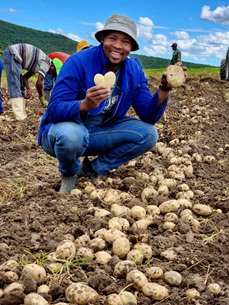 Close to Qonce (King William's Town), the potatoes on Thulani Magida's farm, Juta Agritech, will be harvested in May. Throughout the year, they grow cabbage, pumpkin, and butternuts, which rotate with green mealies (corn) in summer and onion and carrots in winter.
Close to Qonce (King William's Town), the potatoes on Thulani Magida's farm, Juta Agritech, will be harvested in May. Throughout the year, they grow cabbage, pumpkin, and butternuts, which rotate with green mealies (corn) in summer and onion and carrots in winter.
Right: Thulani Magida of Juta Agritech
"We're very lucky, we're in the heart of the Eastern Cape's population," he says, remarking that the East London fresh produce market has been a pillar of strength for them, and Qonce's fresh produce market on their doorstep is frequented by local traders. Juta Agritech also sells its vegetables directly to Spar outlets in Qonce, Alice, and Middeldrift.
Fast food company Steers takes their Sifra potatoes and Squirrels Takeaway, famous in Qonce for the best potato chips around, takes their Mondial.
"We don't have a problem with market access but to compete meaningfully in those markets becomes a challenge," Magida, an agricultural economist and MBA graduate, explains. At his former employer the Humansdorpse Koöperasie in the Langkloof he saw firsthand what makes a farm tick, and decided to take the plunge to be in business for himself.
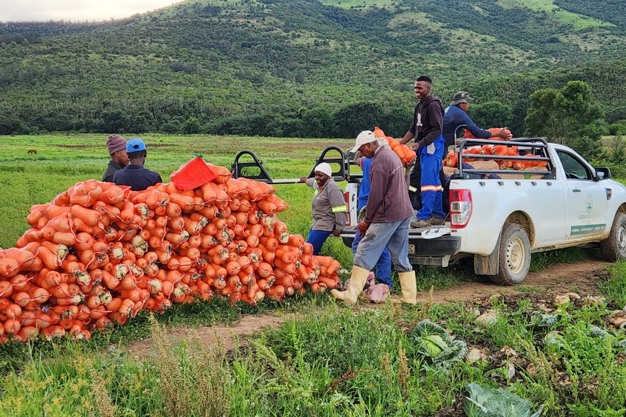
Washed versus unwashed potatoes
In South Africa fresh produce municipal markets only accept washed potatoes. Unwashed potatoes are not commonly sold in South Africa, despite the advantages to shelf life. Magida has a buyer interested in taking his unwashed potatoes over the border to Botswana and Zimbabwe and it is an opportunity he's eager to explore, since the farm still lacks postharvest handling equipment for washing and grading.
"We'd like to be in the washed potato market but it costs us more washing by hand than with machinery. The money we're making just doesn't justify the money we're making. A packline and a washer would help us a lot."
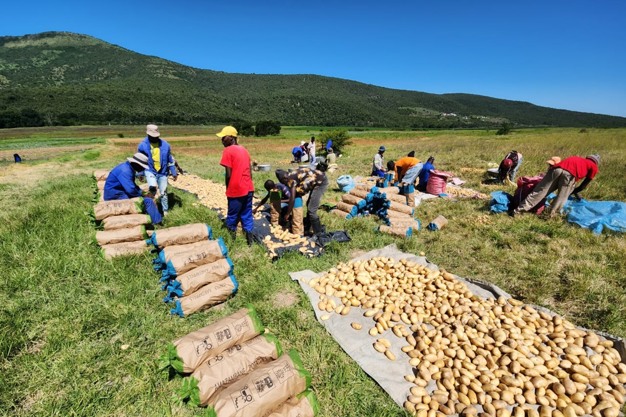
All of their finances go into production at the moment; he has invested all of his savings into the business, leaving little to finesse the product. "Seed potatoes from WesGrow in the North West Province cost us R27,000 [1,340 euros] to transport just for three hectares when there isn't a truckload coming down to the Eastern Cape. We have a good relationship with Ettienne Groenewald from WesGrow, and he helps us when there is a load coming down to the Eastern Cape, and we pay a fraction of the cost. We want to expand to five hectares, and we're targeting 35 tonnes per hectare (the industry average is about 45 tonnes/ha) because our soils still need a bit of work."
He continues: "For very good seed, you're looking at generations 1 to 4, and from them, you can harvest seed, although the yield potential is already affected. Later generations are only good for producing potatoes for consumption."
Generic versus branded potatoes
"One of our challenges is that we have generic potato bags. Our potatoes look very good, but the product next to them in a branded bag looks nicer. It makes it very difficult to compete in the fresh produce market, and it makes our potatoes the target to negotiate prices downwards, despite the quality."
Grading by hand means they currently only pack into three categories, leaving marketing opportunities necessarily untapped.
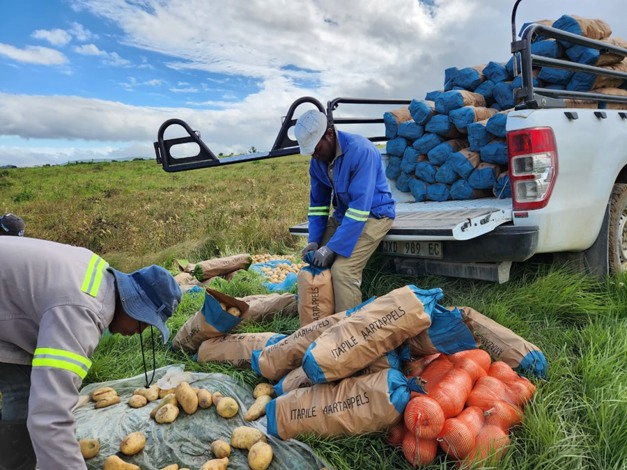
Generic packaging detracts from the quality of their potatoes
Having their own potato bags printed would not be that expensive, but at a production cost of around R110,000/ha [5,470 euros per hectare], their finances currently just don't stretch to the finer points of marketing. (A major benefit to the farm is its location below the Cata Dam, receiving its water by gravity and not through a pump, saving them hugely in electricity and safeguarding them from the corrosive effect load-shedding has had on South African vegetable production.)
The plan is to increase to five hectares, which would bring economies of scale into play when, for instance, bringing in a potato planter on loan from 600km away, as they do.
Some consolidation of offtake would be handy, especially with cabbage which basically is, he remarks, water that you're transporting. "If I could get an offtake from someone coming with a truck, taking 14,000 cabbages at once, it reduces the back and forth to the market for small orders and frees me to focus on production."
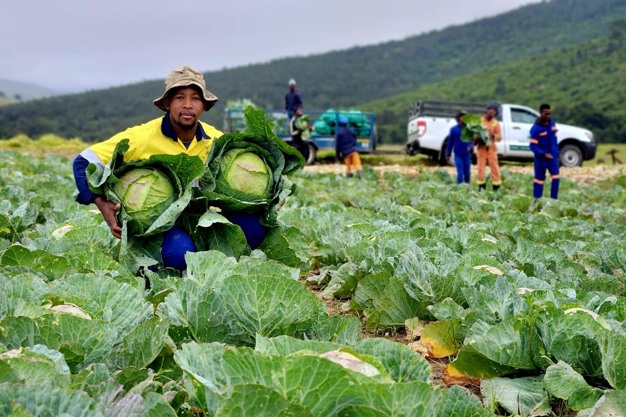
He continues: "In South Africa, we're struggling to commercialize emerging farmers. The reason, besides a lack of financing, is inadequate knowledge of how to do things on a commercial level where everything must be done right all the time. It's a mindset shift."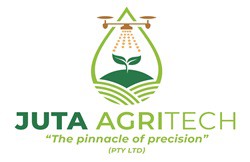 For more information:
For more information:
Thulani Magida
Juta Agritech
Tel.: +27 82 877 4699
Email: [email protected]
